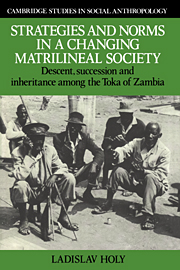 Strategies and Norms in a Changing Matrilineal Society
Strategies and Norms in a Changing Matrilineal Society Book contents
- Frontmatter
- Contents
- List of maps and diagrams
- List of tables
- Acknowledgements
- Introduction
- 1 Descent categories and local ties in traditional Toka society
- 2 Technological development and the restructuring of the relations of production
- 3 Changing norms of inheritance
- 4 The structure of local groups
- 5 The changing concept of the basimukowa
- 6 Mukowa and ritual
- 7 The role of the mukowa in succession
- 8 The role of the mukowa in inheritance
- 9 Mukowa: representational and operational models
- 10 Norms as a strategic resource
- Appendix 1 Village fission in Guta
- Appendix 2 Aspects of individual mobility in Ngwezi
- Notes
- References
- Index
- Cambridge Studies in Social Anthropology
Appendix 2 - Aspects of individual mobility in Ngwezi
Published online by Cambridge University Press: 25 August 2009
- Frontmatter
- Contents
- List of maps and diagrams
- List of tables
- Acknowledgements
- Introduction
- 1 Descent categories and local ties in traditional Toka society
- 2 Technological development and the restructuring of the relations of production
- 3 Changing norms of inheritance
- 4 The structure of local groups
- 5 The changing concept of the basimukowa
- 6 Mukowa and ritual
- 7 The role of the mukowa in succession
- 8 The role of the mukowa in inheritance
- 9 Mukowa: representational and operational models
- 10 Norms as a strategic resource
- Appendix 1 Village fission in Guta
- Appendix 2 Aspects of individual mobility in Ngwezi
- Notes
- References
- Index
- Cambridge Studies in Social Anthropology
Summary
Change of residence upon marriage
Out of 134 women in Ngwezi, 117 (87.3%) changed their residence on marriage and moved to the villages of their husbands; 14 of them did so twice during their lives. The remaining 17 (12.7%) were either joined by their husbands in their own villages or married men from their own villages. The women in my Ngwezi sample accomplished altogether 220 changes of residence, of which 121 (55.0%) occurred upon their marriage.
Only 25 men out of 119 (21.0%) changed their residence upon marriage and left their own villages for those of their wives. As in Guta and Cifokoboyo, most of them had to reside uxorilocally because they had not completed the transfer of bridewealth. For many of them, uxorilocal residence was only a temporary arrangement and later they moved, with their wives, either to their own or to some other village. Because of the otherwise low inter-village mobility of men, uxorilocal residence is a more significant reason for a man's move from one village to another in Ngwezi than in Guta and Cifokoboyo. The Ngwezi men in my sample accomplished altogether 94 moves from one village to another, of which the 25 changes of residence upon marriage represent 26.6% (as against 10.5% in Cifokoboyo).
Change of residence upon the death of the spouse
Thirty-five women in my Ngwezi sample had experienced widowhood, six of them twice. Three had also experienced divorce.
- Type
- Chapter
- Information
- Strategies and Norms in a Changing Matrilineal SocietyDescent, Succession and Inheritance among the Toka of Zambia, pp. 216 - 219Publisher: Cambridge University PressPrint publication year: 1986
